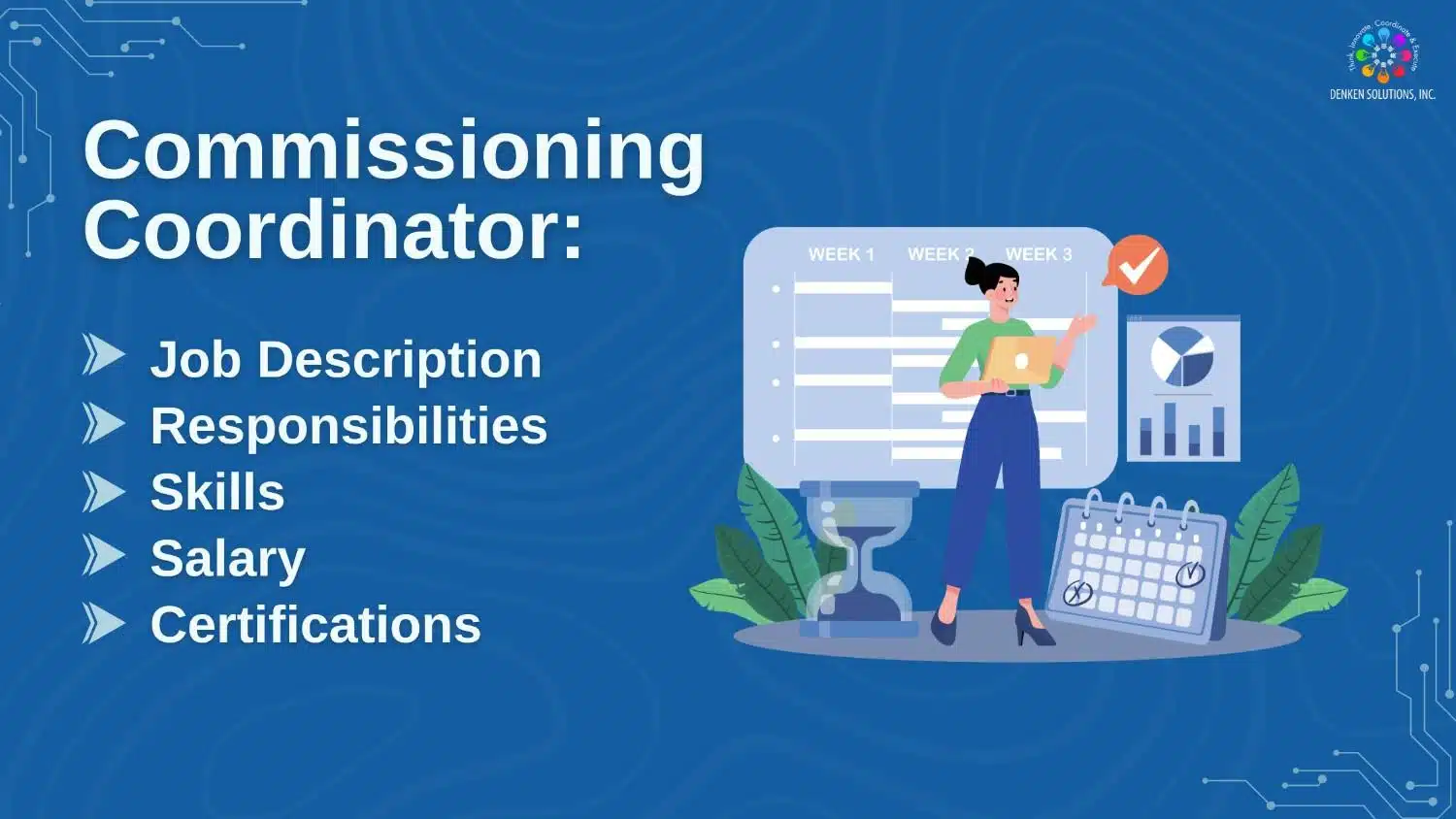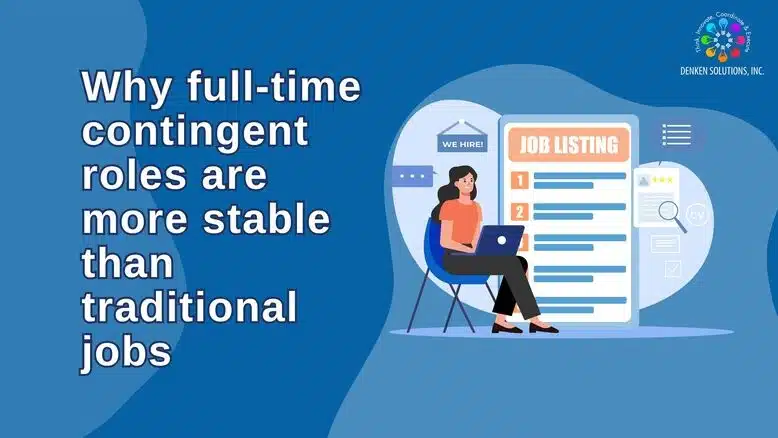A commissioning coordinator is a key player in the installation, testing, and configuration of systems to make sure they operate following the given specifications and standards. As industries change, the role of a commissioning coordinator becomes more critical, especially in specialized sectors. This role is essential in ensuring that all aspects of the infrastructure and system setup adhere to safety and functionality protocols before the systems are fully operational, a responsibility that has become even more critical with evolving staffing industry trends prioritizing specialized, compliance-driven roles in technical fields.
Who is a commission coordinator?
To successfully commission a project, a commissioning coordinator must organize, coordinate, and supervise all associated activities from preliminary planning to final testing and handover while maintaining safety and protocol compliance. They create and oversee the commissioning plan, making sure that every action is in keeping with the objectives and schedule of the project. To preserve a safe working environment, they also make sure that work permit procedures and associated activities are followed. Additionally, they collaborate with a range of stakeholders, including as project teams, operations, maintenance, contractors, vendors, and commissioning teams. Lastly, they create and examine commissioning documentation, such as deviation lists, method statements, single-line diagrams, and site instructions.
Job description of a commission coordinator:
For sales reps or agents, the Commission Coordinator is in charge of monitoring, figuring out, confirming, and processing commission payments. This position supports reporting requirements, works with cross-functional teams to maintain a seamless workflow, and guarantees accuracy and transparency in the commission process.
Responsibilities of a commission coordinator:
The Commission Coordinator is an essential component of the financial or sales operations team who helps to ensure that commission procedures are precise, timely, and transparent. Strong attention to detail, a thorough comprehension of pay scales, and cross-departmental collaboration are necessary for this role. The primary duties that characterize the position and support the effectiveness and integrity of commission-related operations are listed below:
- Answered phones and addressed questions from participants and clients.
- Organize convention center events by creating, compiling, and exporting databases with all the information for each event.
- Make event budgets and distribute monies appropriately.
- Make bookings for speaking events and booths.
- Handle the final reports of the day.
- Handle and store vendor invoices
- Examine public spaces before events and provide custodial personnel guidance. Use social media to raise brand awareness and image.
- Make online and offline connections with local media outlets.
- Respond to inquiries from prospective customers regarding the amenities and facilities.
- Upkeep and assessment of audiovisual equipment
Skills of a commissioning coordinator:
In order to ensure that systems and equipment are installed, tested, and operate in accordance with design requirements, a commissioning coordinator is essential to the management and execution of the commissioning process. To coordinate between engineering, operations, and vendor teams, this position calls for a combination of technical, organizational, and communication skills. A commissioning coordinator with the appropriate skill set can maintain quality, efficiency, and compliance throughout a project’s lifecycle, from paperwork to problem-solving.
However, some of the most important skills include:
- Project coordination:
The capacity to organize, coordinate, and oversee commissioning tasks for various teams and systems.
- Technical proficiency:
strong knowledge of process, mechanical, or electrical systems that are pertinent to the project or industry, such as manufacturing, construction, or oil and gas.
- Attention to detail:
Ensuring proper documentation, adherence to technical standards, and safety compliance throughout the commissioning and testing stages.
- Teamwork and communication:
Competent in coordinating commissioning objectives with cross-functional teams comprising engineers, contractors, vendors, and clients.
- Problem-solving ability:
Quick and effective at recognizing and fixing technical or procedural issues that arise during commissioning.
- Familiarity with the standards of the industry:
Knowledge of regulatory and safety requirements such as ISO, OSHA, or other industry-specific requirements.
- Record-keeping and reporting:
Adept at keeping thorough test reports, commissioning records, punch lists, and handover paperwork.
- Time management:
Managing timelines efficiently to meet tight project deadlines and eliminate downtime.
Important commissioning coordinator certifications:
A professional credential known as the commissioning manager certification honors those who have attained a high degree of expertise in commissioning management. Commissioning managers are in charge of managing every step of the commissioning process, from design and planning to installation, testing, and acceptance. This certification proves that a person possesses the knowledge and expertise needed to oversee a commissioning project successfully.
Project management, building systems engineering, operations and maintenance, energy-saving techniques, rules, codes, and standards are among the subjects covered in the course. The commissioning process can be seen firsthand through the on-the-job training. Those who successfully finish the program receive a Commissioning Management credential.
- Certified commissioning professionals (CCP):
For professionals working in the commissioning industry, there is a certification program called Certified Commissioning Professional (CCP). It is intended to honor those who exhibit a high degree of proficiency, skill, and knowledge in the commissioning process. The Building Commissioning Association (BCA) provides it.
- Certified energy manager (CEM):
The Association of Energy Engineers (AEE) offers a professional qualification called Certified Energy Manager (CEM). An individual’s expertise in energy management, energy auditing, and energy efficiency is demonstrated by their CEM certification.
- Building Commissioning Association (BCA) Certified Commissioning Authority (CCA):
The Certified Commissioning Authority (CCA), a certification program run by the Building Commissioning Association (BCA), honors people who have proven they possess the skills and background necessary to offer independent, third-party commissioning services.
- Leadership in Energy and Environmental Design Accredited Professional (LEED AP):
The U.S. Green Building Council (USGBC) offers a professional certification program called Leadership in Energy and Environmental Design Accredited Professional (LEED AP). The LEED AP accreditation honors those who have proven to comprehend green building concepts and possess the know-how to use them successfully in their professional lives.
Salary of a commissioning coordinator:
The typical commissioning coordinator salary in the United States is around $74,452 per year, with an estimated total compensation of $87,615.
Here’s a more thorough breakdown:
- The average salary is approximately $74,452 annually.
- The total pay estimate is approximately $87,615 annually.
- The salary range often falls between $100,500 and $176,500 annually, although they can range from $70,500 to $189,000.
- The rate per hour is usually around $65 per hour.
- And the monthly pay would be around $11,280 per month.
Why should you choose Denken Solutions to apply for the commissioning coordinator position?
At Denken Solutions, we connect people with purpose rather than just matching talent with job titles. As one of the leading contingent workforce companies, using us to apply for the Commissioning Coordinator role means finding a career partner committed to your long-term development and achievement.
Candidates trust Denken for the following reasons:
- Access to prominent opportunities:
We collaborate with elite clients in fields including technology, engineering, energy, and manufacturing. You consequently get access to exclusive positions that fit your goals and skill set.
- Personalized career support:
To help you stand out, we take the time to learn about your goals, preferences, and background before providing resume advice, interview coaching, and job matches.
- Open communication:
No suppositions. We keep you updated throughout the employment process with clear dates, role requirements, and honest feedback.
- Long-term career planning:
We assist you in creating a career path that goes beyond a single position. We can help you progress whether you’re looking for project-based, contract, or permanent positions.
- Trusted by business leaders:
Our reputation is built on reliability, integrity, and results. Clients and applicants alike rely on us for seamless hiring operations and long-lasting partnerships.



